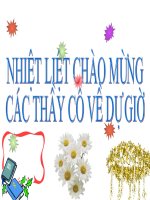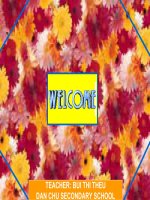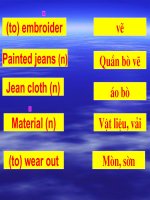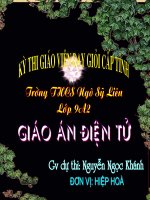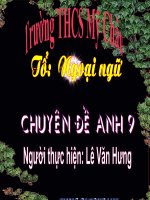- Trang chủ >>
- Văn Mẫu >>
- Văn Chứng Minh
Unit 5 The media week 15
Bạn đang xem bản rút gọn của tài liệu. Xem và tải ngay bản đầy đủ của tài liệu tại đây (110.43 KB, 3 trang )
<span class='text_page_counter'>(1)</span>Period: 29 UNIT 5 : THE MEDIA SPEAK + LISTEN I. Objectives: 1. Knowledge, Skills, Attitude: a. Knowledge: Ss talk about the programs they like and dislike; Listen and complete the table with the information they hear from the conversation. - Vocabulary: Related to the “media”. - Grammar: - Tag questions - Gerunds b. Skills: listening, speaking, less reading and writing c. Attitude: Ss will be educated about choosing suitable type of media. 2. Capacity can be formed and developed for students - Self-learning capability. - Cooperation capacity - Communicative competence II. Preparation 1. Teacher: lesson plane, book, color chalks, pictures, cassette and tape 2. Students: books, notebooks, pen, ruler … III. Students’ activities 1. Warm-up (5’) Teacher’s and students’ activities - T asks, Ss answer the questions.. Content Questions : - Do you like watching TV? - What kinds of TV programs do you like to watch?. 2. Knowledge formation activities (36’) - T explains the requirement. - Two Ss read the dialogue before the class. - T explains new words and explains. - Ss give the meaning of new words. - Ss practice reading new words. - Ss read new words before the class. - T corrects students’ pronunciation. - T explains the requirement. - Ss read the information in the table. - Ss make similar dialogues in pairs. - T calls some pairs of Ss to roleplay the dialogues before the class. - T checks and corrects the mistakes if necessary. - T asks, Ss answer the questions.. III. Speak * Ss talk about the programs they like and dislike. *Pre-speaking Work with a partner. Read the dialogue. New words : - informative (adj) - violent (adj) - documentary (n) *While-speaking Now make similar dialogues. Talk about the programs you like and dislike.. *Post-speaking Questions : - Do you think TV programs are useful? - Which program do you like most? Why? II. Listen * Ss listen and complete the table with the information they hear from the conversation. *Pre-listening.
<span class='text_page_counter'>(2)</span> - T explains the requirement and introduces new words. - Ss pay attention to teacher and take notes. - T has Ss read the information in the table. - T plays the tape. (three times or more) - Ss listen to the tape and complete the blanks. - Ss compare the answers in pairs. - Some Ss give the answers before the class. - T checks and corrects any mistakes if necessary. - Ss copy down the correct answers. - T asks, Ss answer the questions.. Listen to the conversation between Chau and her father. Fill in the table with the information you hear. New words : - major force (n) - journalism(n) *While-listening Answer keys a. the late 19th century b. Radio and newsreels c. in the 1950s d. The Internet *Post-listening a. When did television become popular? b. What became a major force in journalism?. 3. Consolidation 4’ T has Ss ask and answer each other about the programs they like and dislike. T asks Ss to make dialogues (free situation) using tag questions. IV. Experience: ……………………………………………………………………………………………………………………………………………………………………… ……………………………………………………………………………………………………………………………………………………………………… ………………………………………………………………………………………………………………………………………………………………………. Period: 30 UNIT 5: THE MEDIA READ I. Objectives: 1. Knowledge, Skills, Attitude: a. Knowledge: By the end of the lesson, students will know the two sides of the Internet as well as what their friends think about the Internet. - Vocabulary: Related to the media. - Grammar: Present simple tense. b. Skills: listening, speaking, reading and writing c. Attitude: Ss will be educated about two sides of the Internet. 2. Capacity can be formed and developed for students - Self-learning capability. - Communicative competence - Cooperation capacity II. Preparation 1. Teacher: lesson plane, book, color chalks 2. Students: books, notebooks, pen, ruler … III. Students’ activities 1. Warm-up (5’) Teacher’s and students’ activities -T asks, Ss answer the questions.. Content - What kind of media is it? - Have you ever used it? - Is it useful?. 2. Knowledge formation activities (36’) - T has Ss to to talk about two sides of the Internet.. IV. Read * Ss will know the two sides of the Internet as well as.
<span class='text_page_counter'>(3)</span> - T plays the tape. - Ss listen to the tape once. - T introduces new words and explains. - Ss give the meanings of new words. - Ss practice reading new words after teacher. - Some Ss read new words before the class. - T corrects students’ pronunciation if necessary.. what their friends think about the Internet. *Pre-reading : Read the forum on the Internet. - Usefulness: get information, relax, communicate,… . - Harmfulness: costly, virus, bad program, timeconsuming, … . New words: - surf (v) - access (n), get access to, … . - purpose (n) - limitation (n) - time-consuming (adj) - alert (adj) - T has Ss read the text in silience. Then ask *While-reading: and answer the questions in pairs. Answer keys: - T calls some pairs of Ss to ask and answer 1. Sandra uses the Internet to get information and before the class. communicate with her friends and relatives. - T checks and corrects the answers if 2. Because she lives in the countryside, where the necessary. Internet is unavailable. - Ss copy down the correct answers. 3. People use the Internet for education, communication, entertainment, and commerce. 4. Benefits: The Internet is used for muti-purposes: for getting information, for communication, education, entertainment, and commerce. 5. Yes, there are some disadvantages: time-consuming, costly, dangerous because of viruses and bad programs. 6. Students’ answers. 7. Students’ answers. - T asks, Ss answer the questions. *Post-listening: - Do you often use the Internet? - What do you use the Internet for? - How much is an hour for using the Internet? 3. Consolidation 4’ T has Ss list the advantages and disadvantages of the Internet. IV. Experience: ……………………………………………………………………………………………………………………………………………………………………… ……………………………………………………………………………………………………………………………………………………………………… ………………………………………………………………………………………………………………………………………………………………………. Signature of the Leader Week 15: …………………………………... Nguyễn Bích Ngân.
<span class='text_page_counter'>(4)</span>
